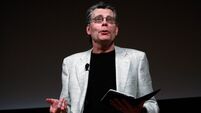Pity the politician in this post-truth age

Minister of State Dara Calleary with his team of canvassers in The Glebe housing estate in Ballina last week. Picture: John O'Grady
Sympathy for politicians is always hard to muster but I can safely say I could think of nothing worse to be doing right now than running for election. The thought of having to stand in front of an electorate with all forms of anger, apathy and ambivalence would not be at all enticing.
Imagine having to go door to door with your canvassers, knocking on doors, not knowing what will come at you from behind the doors. I’ve always admired Jehovah's Witnesses for their spirit in withstanding refusal after refusal to engage but even a hardened Jehovah's Witness would be ill-prepared for the criticism and abuse that politicians can expect on the doors.
Imagine posting something on social media and checking to see what the engagement levels are like, only to see the first five comments under your post all being different extremes of abuse.
Imagine having to tow the party line even though you know the national policy is at odds with what is needed locally. Imagine thinking about alternatives but realising the best way to get things done locally is to be in a government party and hope you can change things from the inside.
Imagine being quizzed, often quite aggressively, on emotive issues like immigration, abortion, gender issues and trying to be fair, express your point of view knowing that it will be impossible to avoid abuse from some side of the debate, sometimes from all sides.
Imagine trying to argue with people who gather their information from some of the murkier parts of the internet, people who are just convinced they are right and that anyone disagreeing with them is a ‘government shill’.
And we wonder why people do not want to go into politics.
But flip it and imagine being a voter now. Where once you got all your information from traditional media – newspapers, TV, radio. It wasn’t perfect but it was subject to checks and balances. Now you have online to contend with.
People get all sorts of information on their social media feeds now and very little of it goes through any sort of gatekeeping.
This column will be edited and perused for errors, legal issues etc. Traditional media hold themselves to standards like these not just to protect themselves from legal issues but because they value integrity and honesty. Is it flawless? Of course not, to err is human. But any errors are unintentional.
Sadly, there is nothing to stand in the way of so many people nowadays posting stuff online that is not just wrong but often dangerously so. Because, fundamentally, while this newspaper is wholly responsible for what appears on its pages and liable for any falsehoods, social media companies like Facebook, X (formerly Twitter), etc, are not.
They have the pretense of reporting functions for abuse but it is clear to see these are not seen as important functions by the social media companies when you look at how long many defamatory and downright dangerous and threatening messages remain online.
The entire climate of discourse would change if the social media sites were liable for comments made and spread on their platforms.
Countless material posted online in the immediate aftermath of an event without any scrutiny or oversight often becomes fact to those who see it. By the time the actual truth is revealed, it is too late. The ‘alternate fact’ has been spread, often by people with sinister objectives.
Within minutes of the assassination attempt of Donald Trump in the US presidential campaign, opinions that it was an ‘inside job’ were going around the world. The people posting them had no information to support this; they just speculated and it caught fire.
We’ve seen so much misinformation (unintentional errors) and disinformation (something the poster knows to be false) around immigration and various proposed centres in recent months, which has been proven to be false in time but not before considerable fear was whipped up in communities.
For the online reader, discerning fact from fiction and information from disinformation has never been harder. Add to that trust in traditional media is lower than I can ever recall, often driven by those who have a reason to seek to undermine traditional media. There is a hostility there like I’ve never witnessed. Look under comments from articles posted on social media from some national newspapers in this country and all you will see is a barrage of abuse.
The article – particularly if it is an opinion column – will be lambasted because it does not conform to the worldview of those commenting. It seems concerted and calculated, and it is quite sinister. It seeks to undermine free speech (a very fluid concept these days depending on your perspective, ultimately free speech includes a huge chunk of responsibility) and seeks to undermine faith in such media outlets.
That’s a very dangerous road to go down. Who are the gatekeepers if not media?
We’re at a critical juncture in civic discourse and civic society. The US election proved that people will believe what it suits them to believe. Any allegations against Trump were agenda-driven, people would convince themselves. Criminal convictions were a conspiracy by the Democrats to undermine a political rival. Let it not go unsaid: the Democrats are no angels; one only has to look at their continuous support of Israel for that. Their attempts to portray themselves as paragons of virtue backfired.
But the fundamental point is that people are so welded to their point of view and have consumed so much information, misinformation and disinformation that they are intractable.
US journalist and author Steven Brill has just brought out a most timely book called .
“We’re at a point where nobody believes anything. Truth as a concept is really in trouble. It’s suspect,” he said.
Facts used to be indisputable. Not anymore.
Add in the anger that is out there and it’s a horrible climate for elections.
I think it is reasonable to conclude that most of the abuse online – certainly in this writer’s experience – is directed by what can be loosely called right-wing towards liberal or left-wing points of view. It often crystalises around issues like immigration, hate-speech laws, women’s rights (whom many would seek to curtail), Covid-19 and various other healthcare-related issues and religion. Some of the most unchristian things said online are by those purporting to be religious.
But, the key is it is not just limited to the right wing. It is true of many on the left wing of ideological thought too.
What we have seen more and more with the proliferation of online sources of information and how people can decide who to follow and who to subscribe to is that people have created echo chambers for themselves. This is where people only read content and follow people they find agreeable to their worldview. Everyone should be willing to have their worldview robustly tested by contrary arguments.
I have frequently disagreed with opinions expressed in the opinion pages of this newspaper (and every other newspaper) but diversity of thought has never been more fundamentally important than now.
Those on the losing sides in the marriage equality and abortion referenda were pilloried after defeat. For clarity, I voted for both of those and feel quite strongly about them but I fully respect the right of others to hold a contrary view. We ought to be able to discuss and argue contrary views without getting personal and abusive.
In Mayo, it is probably fair to say that while the post-truth era has not quite caught hold to the extent that it will fundamentally impact on this election, it is something that is brewing and that people should ignore at their peril.
We cannot cancel the internet and go back to a pre-social media age, much as some of us might wish to. But we do need to change it and manage it far better than heretofore.
While conspiracy theories and alternative facts always existed – the moon landing for instance – they have proliferated with the growth and reach of social media. As Steven Brill notes, we thought these communication innovations and platforms would bring us closer together.
“Instead, we have seen them split us apart into an infinite collection of warring tribes with infinite fears and grievances,” he said.
We are on a very slippery slope.





